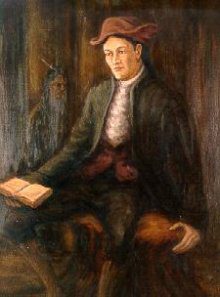In the 1700’s, there was a book published that produced a ripple-like effect of evangelism that could be felt for centuries. It has inspired countless missionaries to persevere through intense adversity, for the sake of bringing the gospel to the lost. It’s a brilliant book that is as equally compelling as it is eloquent. Yet sadly, it is rarely spoken of by modern-day Christians; if nothing changes, I fear an entire generation may miss out on a classic.
The book I speak of is The Life and Diary of David Brainerd by Jonathan Edwards.
You might be surprised to learn that despite Edwards’ many works, The Life and Diary of David Brainerd is his most reprinted. In fact, it has never been out of print since it was originally published in 1749. Still, you are 10 times more likely to overhear strangers in a coffee shop discussing the latest Rob Bell book than this one. While few would contend against its rightful place among other Christian classics, it may be the most under appreciated book in western Christianity today.
For many notable Christians such as John Wesley, Jim Elliott, and William Carry, the work has served as something of a pocket-guide for missionaries and/or men pursuing formal ministry. It’s a book that masterfully deals with the sufferings and struggles one experiences as a missionary. In raw honesty, it details moments of perseverance, prayer, depression, joy, and grace. Theologian John Piper once said that he speculates the modern missionary movement wouldn’t even exist today if it had not been for The Life and Diary of David Brainerd. It’s that important.
Who was David Brainerd? What makes his life and diary so special?

David Brainerd was a seminary dropout (not by choice) who had a passion for winning souls to Christ. After being kicked out of Yale for smarting-off to a professor (something he came to regret later in life), he became a missionary to the Native Americans in what is now the north-eastern United States. He dedicated what remained of his life to these people.
Mr. Brainerd was a missionary for only 4 years and a Christian for a total of 8; he died when he was 29 years old. Brainerd is a reminder of how a short life, when dedicated to Christ, can have a profound influence on our world. God’s plan for Brainerd far exceeded the Native Americans he would personally encounter. His honesty, insight, and struggles have been an inspiration for an untold number of Christians ever since.
It was during this season of missionary work that Mr. Brainerd became close friends with famous theologian, Jonathan Edwards, and his family. So close, in fact, that when David became very ill in the final year of his life, he sought refuge in the Edwards’ home. He was cared for by Jurusha, Jonathan Edwards’ daughter, until his death in 1747. She died not long after David due to the same ailment, tuberculosis. Likely, it was David who infected her.
Despite losing his daughter in such a terrible way, Jonathan Edwards was nothing short of thankful that Mr. Brainerd came to his home. Edwards offers the following commentary on this experience:
“I would conclude my observations on the merciful circumstances of Mr. Brainerd’s death without acknowledging with thankfulness the gracious dispensation of Providence to me and my family in so ordering that he … should be cast hither to my house, in his last sickness, and should die here: so that we had opportunity for much acquaintance and conversation with him, and to show him kindness in such circumstances, and to see his dying behavior, to hear his dying speeches, to receive his dying counsels, and to have the benefit of his dying prayers” (pg. 306, Reflections on the Life of Mr. Brainerd),
In Brainerd’s diary, compiled by Edwards after his death, we learn of his extreme physical and spiritual struggles. He records bouts of intense depression, constant sickness, devastating feelings of isolation, and various other adversities. He dissects the human heart like a surgeon and finds ways to articulate groanings of the heart that are often difficult to capture with words. More than once I have read from Brainerd’s journal entries and exclaimed out loud: “Yes! I have felt that too!”
Studying Brainerd’s sufferings serve as a refreshingly honest take on the Christian life, and more specifically, the life of a missionary. It is a far cry from the “Your Best Life Now” genre of Christianity so prevalent in today’s western thought. The Christian experience was never intended to be easy and prosperous. Instead, it’s laden with promises of hardships and persecutions (1 Timothy 3:12). The focus must not be on this vapor of a life, but on the eternal one found only in Christ. Brainerd’s struggles to keep his afflictions in perspective of the eternal treasure of Christ Jesus is a message our generation deeply needs.
Consider the following words from Brainerd as he discusses the natural hardships of missionary work:
“Such fatigues and hardship as these serve to wean me more from the earth; and, I trust, will make heaven the sweeter. Formerly, when I was thus exposed to cold, rain, etc., I was ready to please myself with the thoughts of enjoying a comfortable house, a warm fire, and other outward comforts; but now these have less place in my heart (through the grace of God) and my eye is more to God for comfort. In this world, I expect tribulation; and it does not now, as formerly, appear strange to me; I don’t in such seasons of difficulty flatter myself that it will be better hereafter; but rather think how much worse it might be; how much greater trials others of God’s children have endured; and how much greater are yet perhaps reserved for me. Blessed be God that he is the comfort to me, under my sharpest trials; and scarce ever lets these thoughts be attended with terror or melancholy; but they are attended frequently with great joy (p. 274).”
This mature, Christian worldview would not be possible unless David Brainerd were thoroughly aware of his sinfulness and desperate need for forgiveness. He regularly documents his wicked heart and repeatedly refers to himself as a worm before the holy God. He writes, “I saw so much of the wickedness of my heart that I longed to get away from myself…I felt almost pressed to death with my own vileness. Oh, what a body of death is there in me…Oh the closest walk with God is the sweetest heaven that can be enjoyed on earth!” (pg. 63)
Far too many Christians today are more concerned with being entertained than exploring the depths of their own sinful hearts. However, this is what Brainerd reminds us over and over that we must do – regardless of the cost. If we are to find wonderful communion with Christ, it will happen by means of prayer, contemplation, and the meditation of scripture. Our estate is fatally flawed, yet grace is overflowing for those who seek it.
I encourage anyone who has never read The Life and Diary of David Brainerd to find a copy, read it, and share it with someone else. It’s a book with a message that an entire generation of Christians needs to hear. My plea to read this book feels especially urgent as our culture continues to grow more hostile towards Christianity and ideals. Persecution and suffering are coming; Indeed, it is promised for all who desire to live a godly life.
In closing, I will leave you with one of my favorite quotes from the book – Brainerd’s description of his conversion experience, dated July 12, 1739:
One morning, while I was walking in a solitary place, as usual, I at once saw that all my contrivances and projects to effect or procure deliverance and salvation for myself, were utterly in vain; I was brought quite to a stand, as finding myself totally lost…
(Then) unspeakable glory seemed to open to the view and apprehension of my soul. It was a new inward apprehension or view that I had of God, such as I never had before, nor any thing which had the least resemblance of it. I stood still, wondered, and admired! I knew that I never had seen before anything comparable to it for excellency and beauty; it was widely different from all the conceptions that ever I had of God, or things divine.
My soul rejoiced with joy unspeakable, to see such a God, such a glorious Divine Being; and I was inwardly pleased and satisfied that he should be God over all for ever and ever. My soul was so captivated and delighted with the excellency, loveliness, greatness, and other perfections of God, that I was even swallowed up in him; at least to that degree, that I had no thought (as I remember) at first about my own salvation, and scarce reflected there was such a creature as myself (Pg. 13).













